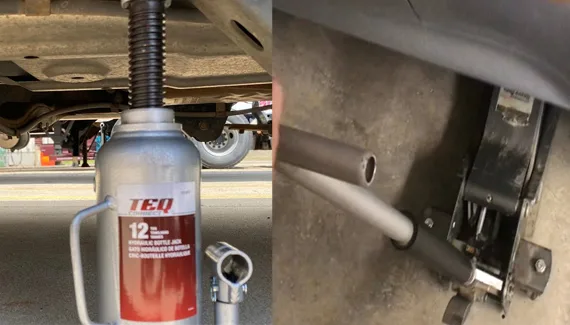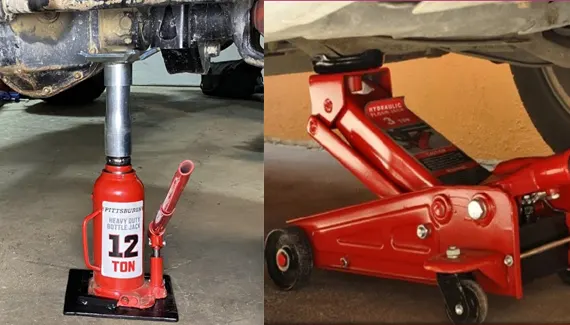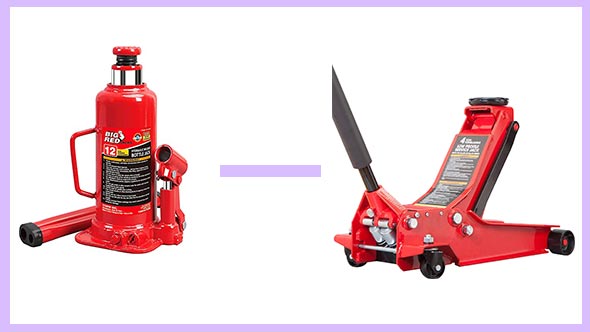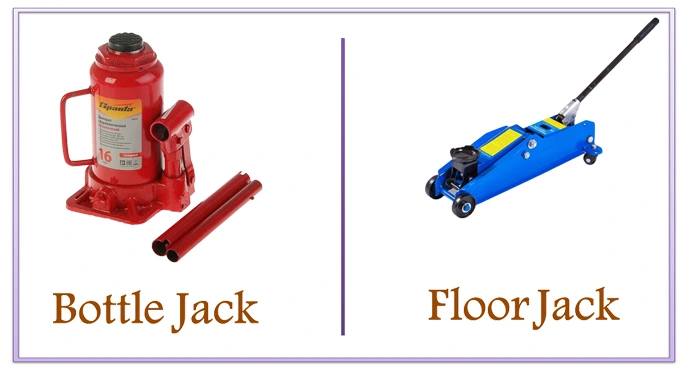Last Updated on June 3, 2023
As an RV owner, understanding the differences between a bottle jack and a floor jack can be essential for properly maintaining and repairing your vehicle.
While both bottle and floor jacks serve the same purpose of lifting the RV off the ground, they have distinct differences in weight capacity, stability, mobility, ease of use, etc.
The design of these jacks is fundamentally different. Bottle jacks are cylindrical in shape, while floor jacks have a horizontal hydraulic cylinder.
This design difference also impacts their stability. Floor jacks typically provide more stability than bottle jacks, making them safer for many RV owners.
When it comes to lifting capacity, bottle jacks have the upper hand, as they can typically lift more weight than floor jacks.
Ease of use is another important factor. Floor jacks are usually easier to move and maneuver compared to bottle jacks.
Now let’s compare floor jacks vs bottle jacks for RVs. An enlightening exploration awaits.
Compare Two Options for Lifting Up Your RV – Bottle Jack vs Floor Jack

When you need to lift your RV, two popular jack types can help, bottle jacks and floor jacks.
But before you pick one up for the job, it pays off to know their key differences, from how they look down to what load capacity each offers. Comparing both options ensures your sweet ride stays safe during maintenance.
1. Design Differences
When you’re looking at bottle jacks and floor jacks, the first thing you’ll notice is their different shapes.
Bottle jacks are designed with a vertical, cylindrical shape that stands upright. This design focuses on providing stability and strength due to its small footprint, which makes it great for lifting heavy weights.
On the other hand, floor jacks feature a horizontal design that puts them closer to the ground. This design allows floor jacks to slide easily under low-clearance vehicles, such as sports cars or race cars.
So, if you’re comparing these two jacks, remember that their shapes dictate their primary uses and lifting capabilities.
2. Lifting Capacity
In the realm of lifting equipment, the best bottle jack stands out as a true powerhouse regarding lifting capacity.
With a range that spans from 2 to 50 tons, it effortlessly surpasses the capabilities of floor jacks, which can typically handle only 1.5 to 4 tons.
For those working with more formidable loads, some industrial-grade bottle jacks even boast an astounding lifting capacity of up to 100 tons.
While floor jacks may be suitable for certain recreational vehicle models, it is important to accurately assess your RV’s weight to ensure that you select the appropriate jack for the task.
With its impressive strength, the bottle jack undoubtedly offers a dependable option in situations requiring more significant lifting power.
3. Height Clearance
Floor jacks are built to be low to the ground, allowing them to slide easily under RVs that have low clearances. This is particularly helpful when working on an RV that doesn’t have much space between the ground and the undercarriage.
Meanwhile, bottle jacks are designed to stand vertically and lift more weight to greater heights due to their hydraulic capabilities. This makes them a great choice for RVs that have higher clearances or require lifting to higher elevations for maintenance or repair tasks.
4. Stability
Stability is a crucial factor when lifting heavy vehicles like RVs, and floor jacks and bottle jacks each have their own strengths in this area.
A floor jack’s long base allows it to distribute weight evenly, providing more stability during the lifting process. This is especially useful when you’re working on uneven or soft surfaces, as a stable base reduces the chances of the jack slipping or the vehicle becoming unstable.
Bottle jacks, in comparison, have a smaller base and can be more prone to tipping over or slipping off an axle if the surface isn’t flat or if the weight isn’t evenly distributed.
This can be a concern when you’re working on an RV with an irregular weight distribution or when the ground is uneven or unstable. Always take extra precautions, such as using jack stands, to ensure safety when using a hydraulic bottle jack.
5. Maneuverability
When it comes to maneuverability, the floor jack takes the lead. Thanks to its wheels, it can effortlessly glide under your RV or fifth wheel and provide easy access to the lifting points.
This is particularly handy when you need to perform maintenance or repairs on your recreational vehicle because it allows you to quickly and efficiently position the jack.
On the other hand, bottle jacks are a bit more cumbersome to work with. These jacks don’t have wheels, making it more challenging to move them around and position them properly under your RV.
Bottle jacks also require more clearance space. This means that you might need to lift your RV slightly by other means to create enough room to use a bottle jack.
6. Average Size and Weight

Bottle jacks typically offer a more compact and lightweight alternative, with heights extending from 16 to 20 inches and weights ranging between 20 and 30 pounds.
Conversely, floor jacks are more substantial in size as they possess a similar height range to bottle jacks, yet can be much heavier: A 3-ton floor jack, for instance, can weigh approximately 70 pounds or more.
7. Portability
Regarding portability, bottle jacks have the advantage due to their smaller size and lighter weight. This means they’re easier to carry and move around when you’re on the road with your RV.
Floor jacks are bulkier and heavier, making them less convenient to transport. This could be a crucial factor in your decision-making process, especially if you plan to do a lot of traveling with your RV or have limited storage space.
8. Storage
Bottle jacks undeniably triumph over floor jacks when it comes to storage, particularly for RV owners grappling with limited space. Their compact size allows them to be conveniently stashed away in snug compartments or discreetly tucked under seats.
In contrast, floor jacks tend to be more cumbersome, occupying a larger footprint. Recognizing this drawback, some manufacturers have ingeniously developed compact floor jacks tailored for ease of storage.
Although these streamlined models are more fitting for RV utilization, they may still be somewhat larger than their bottle jack counterparts.
9. Lift Range
When comparing a bottle jack to a floor jack, another significant difference is their lift range. A bottle jack typically has a lift range of 5 to 22 inches. This lift range suits smaller vehicles or those with high ground clearance, like an RV.
On the other hand, a floor jack usually has a lift range of about 21 inches. This range is suitable for lifting a variety of vehicle sizes and types but might not provide the necessary height for some RVs.
10. Maintenance
Another vital difference between bottle jacks and floor jacks regarding RV usage is maintenance. Bottle jacks are known for their simplicity, making them relatively easy to maintain.
They have fewer moving parts, which translates to less potential wear and tear over time. This can be a significant advantage for those who don’t have a lot of experience with mechanical tools or don’t want to spend time maintaining their jack.
In contrast, floor jacks are more complex and require regular maintenance to ensure they function properly.
11. Price
When considering the cost of a jack for your RV, it’s important to keep in mind that bottle jacks tend to be less expensive than floor jacks.
Their simpler design and smaller size often mean they come with a lower price tag, which can be attractive to RV owners who want a budget-friendly option for basic lifting tasks.
However, you should remember that the price of a bottle jack can still vary depending on factors such as brand, quality, and weight lifting capacity. It’s worth shopping around to find the best option that fits your needs and budget.
Floor jacks, on the other hand, usually come with a higher price tag due to their more complex design and often higher lifting capacity.
While this may be a deterrent for some, it’s worth considering that floor jacks offer more stability and safety during the lifting process.
How Long Will a Bottle Jack and Floor Jack Hold Your RV’s Weight?

The length of time that a bottle or floor jack can safely hold the weight of an RV depends on several factors, such as the weight of the RV, the capacity of the jack, and the condition of the jack.
Bottle jacks and floor jacks are designed to provide temporary lifting and support, and they are not meant to be used as a permanent solution.
As a general guideline, you should not leave your RV on a floor jack or bottle jack for an extended period of time. It is recommended that you use a jack stand to support the weight of the RV instead.
If you must use a bottle jack or floor jack to lift your RV temporarily, make sure that the jack is properly rated for the weight of the RV and that you follow the manufacturer’s instructions for safe use.
In general, a properly functioning hydraulic jack should be able to hold an RV’s weight for several hours.
Bottle Jack Vs Floor Jack – Which One is Most Safer?
When considering safety in the context of bottle jacks versus floor jacks, the floor jacks emerge as the superior choice due to their inherent design and stability features.
Floor jacks boast a larger base and an extended arm, delivering robust support and balance, even when confronted with uneven terrain. This renders them far less prone to tipping over or sliding while working on a vehicle.
Conversely, bottle jacks may not provide the same level of safety, primarily because of their compact design.
With a smaller base, they are at a higher risk of toppling or skidding, particularly if the surface is less than perfectly level. Overall, those who prioritize safety will find floor jacks as the most reliable option.
Can You Use a Bottle Jack as an RV Stabilizer?
While it is technically possible to use a bottle jack to stabilize your RV, it is important to emphasize that this method is not recommended due to several significant concerns.
Primarily, bottle jacks are not designed to provide long-term stability or support for an RV or travel trailer, which can result in dangerous conditions and potential damage.
Bottle jacks are specifically engineered for lifting purposes, such as raising vehicles, changing tires, or performing maintenance.
They comprise a hydraulic mechanism that allows you to apply force with minimal effort and is built to handle a specific weight capacity over a short period.
However, this lifting function does not extend to stability or support for an extended period.
When utilized as an RV stabilizer, bottle jacks may be prone to slipping or failing, posing threats to both personal safety and the integrity of the RV structure.
This risk is heightened due to the disproportionate weight distribution of an RV, as weight may not be evenly balanced on a bottle jack point of contact.
Instead of using a bottle jack, investing in stabilizing jacks specifically designed for RVs is highly recommended.
Make Your RV Maintenance a Breeze: Decide Between Bottle Jacks & Floor Jacks
Both bottle jacks and floor jacks have their own unique advantages and drawbacks when it comes to maintaining and repairing your RV. The decision ultimately comes down to your specific needs, preferences, and available storage space.
If your main concern is stability and ease of use, a floor jack may be the right choice for you. On the other hand, if lifting capacity and compact storage are your priorities, a bottle jack might be a better fit.
Regardless of which type of car jack you choose, always ensure you follow safety precautions and use the proper equipment to guarantee a seamless and risk-free RV maintenance experience.

